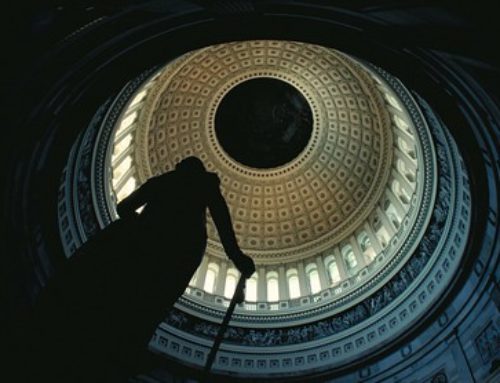Rep. Rogers (R-MI) is bringing a privileged resolution to the floor to reprimand Rep. Murtha (D-PA) for threatening to eliminate any Rogers earmarks now and forever because he offered a motion to recommit the Intelligence authorization bill with instructions to strip funding for a Murtha earmark. I can provide you a copy of the resolution. From what I understand the resolution should be offered today, and there may be an effort to table (kill) it straightaway, otherwise it has to be voted on within two days.
The rule that Murtha allegedly violated states that members cannot condition earmark funding on votes. It was a new rule adopted by the Democrats – mostly in response from the Rep. Tom “The Hammer” DeLay days of earmark trading and specifically the arm-twisting Rep. Nick Smith (R-M) received to get his vote on the Medicare prescription drug benefit.
We all know what Rep. Murtha thinks about the new rules changes, on the eve of his failed leadership bid he told the Blue Dog democrats that the new rules were “total crap.” And Rep. Murtha is a well know power player in earmarks and logrolling. Rep. Murtha has proven adept at using earmarks as both a carrot and a stick, rewarding favored behavior with more and punishing those who step out of line with less. See the excellent NYT article from this last fall describing Rep. Murtha's tactics (below).
What this turn events did was push the nasty back room pressure that goes on in Congress out to the forefront. Rather than rallying around their man, Democrats should take credit that their new rules made this challenge possible, break with the pay-to-play past and hold Rep. Murtha accountable for his actions.
The New York Times
October 2, 2006 Monday
Trading Votes for Pork Across the House Aisle
BYLINE: By DAVID D. KIRKPATRICK; Aron Pilhofer contributed reporting.
For more than a decade, Representative John P. Murtha of Pennsylvania has operated a political trading post in a back corner of the House of Representatives.
A gang of about two dozen Democrats mill around his seat. A procession of others walk back to request pet spending projects, known as earmarks. And Republicans come by, asking him to enlist some of those Democrats to join them on close votes. ''Whether they get what they want in the bill or they get the votes they are looking for, nobody ever leaves completely disappointed,'' said Representative Paul E. Kanjorski, a Pennsylvania Democrat often found in what is known as the Murtha corner.
Outside Washington, Mr. Murtha, a Vietnam veteran and longtime hawk, may be best known for his break with the president over the Iraq war last fall. But inside the Capitol, he is best known for turning earmarks into power. As the top Democrat on the House military spending subcommittee, he often delivers Democratic votes to Republican leaders in a tacit exchange for earmarks for himself and his allies.
In the last year, Democratic and Republican floor watchers say, Mr. Murtha has helped Republicans round up enough Democratic votes to narrowly block a host of Democratic proposals: to investigate federal contracting fraud in Iraq, to reform lobbying laws, to increase financing for flood control, to add $150 million for veterans' health care and job training, and to exempt middle-class families from the alternative minimum tax.
In one case that particularly irked Democratic partisans, Mr. Murtha led three others in voting against a politically vulnerable Louisiana Democrat's proposal to divert money intended to be spent on base closings to research prosthetic limbs for veterans. It failed by one vote.
For their ''nays'' on that and other matters, all four Democrats were rewarded. In the weeks after the vote, they claimed credit for a total of more than $250 million in earmarks in the 2006 appropriations bills. Mr. Murtha alone brought home about $80 million for his district and $120 million for his state, according to Taxpayers for Common Sense, a nonpartisan group that tracks such projects.
Mr. Murtha, who announced a bid this spring to become the next House Democratic leader, acknowledges that some Democrats grouse about his history of leading others across the aisle. (Several Democrats said as much, but none would speak publicly.) He confirmed working with Republicans on the Iraq war spending vote that blocked the Democratic corruption investigation, but said he did not remember the others. He said he always acted on principle, working with Republicans either because he agreed with them or to uphold private agreements about spending bills.
''You just need to get the things done, so you give them the votes to get the things done,'' he said in an interview. ''There is no question that some projects come out of it for our members, and that is not a bad thing.'' He added, ''Deal making is what Congress is all about.''
Mr. Murtha can punish lawmakers, as well. Those who do not support the defense spending bill, for example, discover their next earmark requests go nowhere. ''Let me tell you the facts of life,'' Mr. Murtha said he tells balky legislators. ''If you vote against this bill, you won't have any input at all the next time.''
Earmarks — often buried deep in complex bills by unidentified lawmakers — have come under new scrutiny since the conviction last fall of Representative Randy Cunningham, a California Republican on the defense-spending panel who accepted more than $2.4 million in bribes from contractors. The cost of earmarks has tripled in the last decade to about $64 billion a year, according to the Congressional Research Service. Mr. Murtha and other lawmakers say many earmarks are worthwhile, but critics charge that they waste taxpayers' money, encourage cronyism and foster self-dealing.
Some members of Congress complain that earmarks corrupt lawmaking in other ways. ''They are used as internal bribery in order to get members to vote for a piece of legislation they wouldn't ordinarily give two minutes to,'' said Representative David R. Obey of Wisconsin, the top Democrat on the House Appropriations Committee.
No one is more adept at such trading than Mr. Murtha, say current and former members, Congressional aides and outside observers. ''He delivers Democrats for key votes, which increases his clout and ability to get more earmarks, which then increases his ability to get Democratic votes,'' said Steve Ellis, a vice president of Taxpayers for Common Sense.
Mr. Murtha leans right on abortion rights and gun control but left on labor, tax and economic issues. And he consistently opposes ethics reform or disclosure requirements, including a proposal this year that would have required lawmakers to sign their names to earmarks, on the grounds that voters police lawmakers' actions.
He has sided with Republicans 169 times on close votes since 1994, more often than all but three of the most conservative Democrats. Many of those votes have been on nonideological but politically pivotal questions. For example, Mr. Murtha has often led members from his corner crowd to vote for procedural rules that limit potential amendments or debate on Republican bills — votes that typically follow party loyalty.
Dick Armey, a former Republican majority leader, said his party's strategists would often tell him, ''Murtha will get us some votes.''
At 74, Mr. Murtha remains an imposing figure: 6 feet 3 inches tall, with giant hands spread wide as he talks and size 12 shoes stuck out into the aisle. His corner perch is the only seat informally reserved for an individual lawmaker. ''No one else dares sit there,'' said Representative Mike Doyle, a Pennsylvania Democrat and Murtha protege.
He can also be very persuasive, thanks to his position on the spending committee. ''If Jack Murtha tells you he needs your vote, then you would have to think very hard before not delivering it,'' said Representative James P. Moran, a Virginia Democrat who sits on the subcommittee and in Mr. Murtha's corner. ''There are just too many chits out there.''
Members have watched with envy as Mr. Murtha has used earmarks to remake Johnstown, Pa., an impoverished former steel town that now includes a Murtha highway, a Murtha airport and Murtha health centers. He has steered billions of dollars to his district over the years, including more than $80 million in the defense spending bill passed Friday, according to a preliminary tally.
Mr. Murtha's patronage has transformed Johnstown into a national hub of the defense business, attracting giants like Lockheed Martin and Northrop Grumman. He even built one contractor from scratch. In 1988, Mr. Murtha asked the chancellor of the University of Pittsburgh to set up a nonprofit that could use Navy money to establish a Center for Excellence in Metalworking in Johnstown.
Since then, Mr. Murtha has delivered earmarks to the organization, now called Concurrent Technologies Corporation, for work like consulting on counterterrorism, designing ejection seats for pilots and developing software. The military and other federal agencies have paid Concurrent nearly a billion dollars in grants and contracts since 1999. In the most recent defense bill, Mr. Murtha inserted $1.3 million for Concurrent to research Army tank designs.
''It is Murtha's pet rock,'' said Stephen Gage, chief executive of an Ohio economic development organization that once worked with Concurrent.
Concurrent's executives, in turn, have given more than $114,000 to the congressman's campaigns over the last three elections, making it one of his biggest corporate donors. The organization pays about $500,000 a year to a lobbying firm, the PMA Group, whose executives and clients have given Mr. Murtha more than $1.2 million in donations since 1999.
Mr. Murtha's brother, Kit, recently retired from a smaller lobbying firm, KSA Consulting, that sought defense earmarks and represented many companies in Mr. Murtha's district. From 1998 through 2003, he received more contributions from military contractors than has any other member of the House, according to the Center for Public Integrity, a nonpartisan group.
Elected to the House in 1974, Mr. Murtha learned the politics of parochial projects from former Speaker Tip O'Neill, who named Mr. Murtha to the defense appropriations subcommittee and used him as his eyes and ears on the floor.
He survived a brush with scandal during the 1980 Abscam investigation, when he did not accept but did not rule out taking a $50,000 bribe from undercover agents of the Federal Bureau of Investigation; he eventually became a cooperating witness.
After becoming chairman of the defense spending panel in 1989, Mr. Murtha imposed a new discipline. Previously, the House often debated defense spending bills, which account for about half of federal discretionary spending, for weeks of contentious amendments and speeches, both in the committee and on the floor. Most Democrats often voted against the measures. ''It took day after day after day,'' Mr. Murtha recalled.
Not any more. Mr. Murtha installed a new system that the Republicans have continued: the chairman and ranking member work out the details behind closed doors, pack the bill with plenty of earmarks, and link future projects for members to their support for the bill. The appropriations committee now typically debates and approves the bill in less than eight minutes and the full House in less than half an hour. (The $437 billion measure passed last week took under 20 minutes.)
''The defense community has some presence in almost every Congressional district — or so long as you vote for the bill, it does,'' said Mr. Moran, the Virginia Democrat. Mr. Murtha would ''see to it'' that members understood that those with earmarks in the bill who considered voting against it ''better set their sights lower the next time,'' Mr. Moran said.
Mr. Murtha gave up the chairman's gavel when the Republicans took over the House in 1994 but managed to retain an unusual share of power. He has sole authority to grant nearly half the panel's earmarks and decide on all requests from Democrats, he said. Many minority appropriators work closely with their subcommittee chairmen, but Mr. Murtha's collaboration was especially close. He has worked for decades as a partner with the committee's senior Republicans. He still receives frequent visits from Representative Jerry Lewis, the California Republican who is chairman of the Appropriations Committee and is now under scrutiny in a federal investigation that grew out of the Cunningham scandal.
Mr. Murtha has used his influence in the caucus to place friends in strategic positions on appropriations committees and other House panels. Representative Nancy Pelosi, a California liberal who is the current Democratic leader, is a close Murtha ally. He put her on the appropriations committee early in her career and managed her campaign to be leader.
His friends say Mr. Murtha often guides their votes, especially on defense matters. ''He is sort of like the general and we are the lieutenants,'' Mr. Doyle said.
Mr. Murtha takes care of his troops. Beginning with $1.5 million in 2003, for example, he has earmarked several million for the Doyle Manufacturing Technology Center to help lure military contractors to Mr. Doyle's district.
Mr. Kanjorski, the Pennsylvania Democrat, said he had help on ''8 to 10'' projects, including a $9.5 million deal four years ago for research by a firm partly owned by his nephews. In an interview, Mr. Kanjorski said his relatives ''just happened to be the only people who would take responsibility'' for developing the technology, which involved using water jets to pulverize materials. He said he recently gave Mr. Murtha a pair of high-tech disease-resistant socks made with silver fibers by a company in his district. After padding around in them, Mr. Kanjorski said, Mr. Murtha was so pleased that he agreed to an earmark to buy them for soldiers.
Other lawmakers have learned not to cross him. Aides to Representative Allyson Y. Schwartz, a freshman from the Philadelphia suburbs, say she has become a regular in the Murtha corner in part because her predecessor, a reform-minded Democrat who sometimes clashed with Mr. Murtha, suffered in his ability to obtain earmarks. In contrast, Mr. Murtha has helped Ms. Schwartz obtain a $7 million contract for a local defense firm and $150,000 to refurbish a historic inn in her district.
A spokeswoman for Ms. Schwartz said only that ''she is proud of her relationship with Mr. Murtha.'' (The predecessor, Joe Hoeffel, now a Pennsylvania development official, acknowledged disagreements with Mr. Murtha but said they had worked well together.)
Mr. Murtha said he and his staff did their best to vet every earmark request but ultimately relied on the judgment of the members. He said he always asks, ''Is this worthwhile not only to your district but to the country?''
Since Mr. Murtha announced his ambition to become party leader if the Democrats take the House this fall, supporters of his rival, Representative Steny H. Hoyer, the Maryland Democrat who is the party's whip, have begun quietly questioning Mr. Murtha's deal making. They argue that Mr. Murtha's pacts with Republicans should disqualify him for the job. Mr. Hoyer declined to comment.
Mr. Murtha, for his part, argued that his experience brokering votes would be an asset if Ms. Pelosi became the speaker. Running the House with a slim majority would require bipartisanship and party discipline. ''I come across a little tougher,'' he said. ''And I do have a lot of people that vote with me on an awful lot of issues.''
Representative John P. Murtha, the top Democrat on the Defense Appropriations Subcommittee, is known for delivering pet spending projects, or earmarks, to Democrats while rounding up Democratic votes for Republicans. He sits in a corner seat of the floor surrounded by allies. Here are some of the earmarks they have received from his committee.
Mike Doyle (D)
Pennsylvania, 14th District
Millions for the Doyle Center for Manufacturing Technology in Pittsburgh.
Alan B. Mollohan (D)
West Virginia, First District
$3.5 million for bomb-detecting robots. Resigned from the ethics committee amid an inquiry into his earmarks.
Tim Holden (D)
Pennsylvania, 17th District
300 Stryker light-armed combat vehicles for his district's National Guard.
John P. Murtha (D)
Pennsylvania, 12th District
Peter J. Visclosky (D)
Indiana, First District
More than $7 million for antidrug programs for students.
Paul E. Kanjorski (D)
Pennsylvania, 11th District
Money to buy disease-resistant socks for soldiers from Noble Fiber Technologies of Scranton, Pa.
James P. Moran (D)
Virginia, Eighth District
Another member of the subcommittee, he took credit for an $18.5 million project to commemorate Sept. 11.
John B. Larson (D)
Connecticut, First District
Millions for Pratt & Whitney, a major military contractor in his district.







Get Social